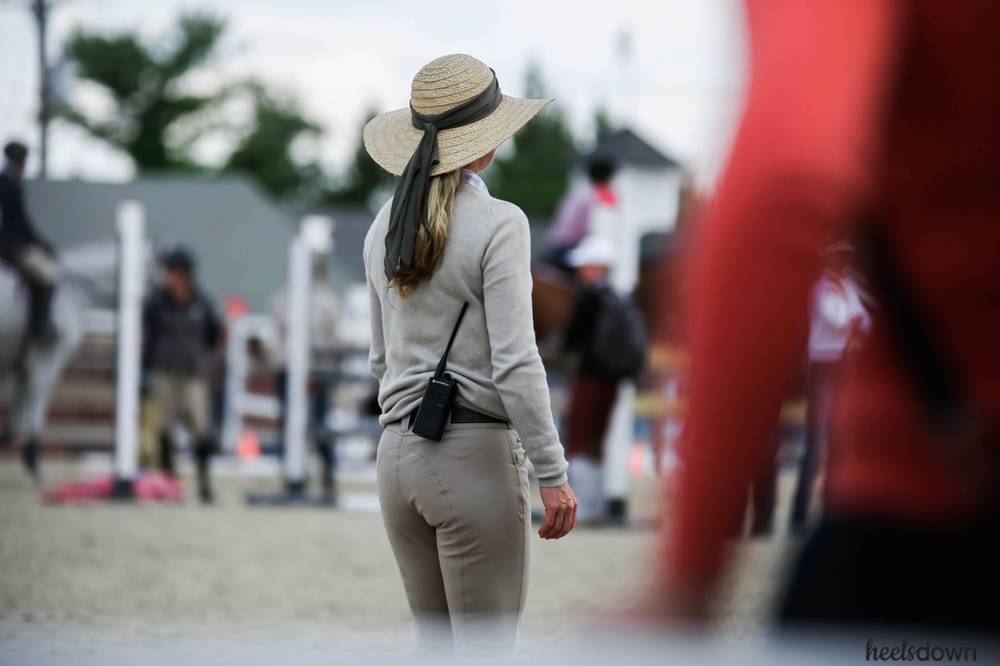Anyone Can Be a Trainer: Does Certification Matter?

Finding the right trainer is one of the most important decisions you will make for your riding; it’s right up there with choosing a horse and a discipline. Your trainer is more than just your riding instructor; a good trainer is your coach, your consultant, your psychologist, and your lifeguard. Like any good relationship, trust is crucial between trainer and student.
It’s important to remember that anyone, regardless of their horse and riding experience, credentials, history, etc., can post an ad and a per-lesson rate and call themselves a trainer; and there are bad trainers out there. There are trainers who will over-face you, over-horse you, teach you bad habits, or downright put you in a dangerous scenario. Often, this is born from lack of knowledge, and not malice. Either way, though, choosing a trainer that has achieved some level of certification can give you peace of mind that he or she has met a certain standard of horsemanship, riding or coaching ability, and safety.
There are a variety of certifications that trainers can complete that will put their riding, horsemanship, coaching and safety skills to the test. The American Riding Instructors Association Certification is one example of a cross-discipline certification organization, but more commonly, trainers gain certification in their specific discipline through the national governing body of their sport.
What Are Trainer Certifications All About?
Eliza Sydnor Romm, a dressage trainer, instructor and FEI rider in Chapel Hill, NC, is a certified instructor through the U.S. Dressage Federation (USDF). The USDF’s Certification Program is “designed to educate dressage instructors to teach the classical concepts of dressage,” according to the USDF website.
“You can be assured that a USDF certified instructor has passed a rigorous testing including longing the horse, longing the rider for the seat, teaching, and riding as well as a thorough understanding of theory,” says Eliza. “In addition, safety is always the number one priority in each of these areas, so you know you will get someone who is safety conscious as well as First Aid and CPR certified.”
When trainers are certified, their information is easily accessible as well, she explains. “It’s an easy way to search for a trainer. If you are moving to a new area, you can use the USDF website to search for certified instructors in your state or region.”
Sue Lyman, a certified trainer through the U.S. Hunter Jumper Association (USHJA) in The Plains, VA, agrees. “I am listed in the directory on the USHJA site, where there is a profile page. I have had people contact me through this while looking for a certified trainer.”
Sue Hershey is the Educational Consultant for the U.S. Eventing Association (USEA) Instructor Certification Program (ICP). “A USEA ICP-Certified instructor teaches you and your horse in a developmentally progressive way,” she says. “‘The basics’ include a relaxed and willing horse and a well-balanced rider with an independent seat, resulting in a positive working partnership. Every rider at every level benefits from high quality eyes on the ground!”
Riding Skills vs. Teaching Skills
Many people will look to skilled riders for instruction, and while that certainly can be successful, riding skills and coaching skills do not necessarily go hand in hand.
“A certified instructor has to be able to give an organized lesson or training session in 45 minutes, following this pattern: safety check, assessment period, plan for the training/lesson, execution of the plan, cool down and reassessment,” explained Eliza. “While this might sound very rigid, it generally makes for a much more organized learning experience for the student (or the horse!) and leaves the student with a better understanding of what they worked on and how to continue to progress in between lessons.”
For many trainers, including Eliza, the certification process not only verifies their ability to teach others, but enhances it, too. “The certification process taught me a lot more about teaching, and made me a more organized instructor. It also gave me confidence that I had the skills necessary to begin my career as a professional, since I was so young. I got certified to teach through Second Level at 21 and Fourth Level at 24. I think it gave some new students confidence that I knew my stuff even though I was quite young.”
Continuing education is often mandatory for certified trainers for years after they gain their certification, usually in the form of workshops and clinics. “The continuing education keeps my training fresh. I believe it is important to keep learning and developing professionally. The knowledge gained is reflected in my teaching, so my clients benefit from this as well,” said Sue Lyman.
Is It More Expensive?
As far as cost goes, Eliza does not believe that riding with a USDF certified trainer is more expensive. Trainers determine their own rates in accordance with facilities, geographical region, etc.
“I don’t charge higher prices because I am a certified trainer,” agreed Sue Lyman, despite the costs and time involved with becoming certified, including insurance. “A USHJA certified trainer has gone through Trainer Certification Program clinics, a criminal background test, has supplied multiple references, and has taken a test on their knowledge of horsemanship. All USHJA certified trainers have to have a liability insurance policy in place.”
Weighing the Pros and Cons
In your search for a trainer, there are a lot of factors to consider other than certification. How far away are you willing to travel to ride with a trainer? What are his or her fees and does that fit into your budget? How often is this trainer going to be unavailable due to his or her competition schedule? Does he or she ride and handle their own horses in a way that you feel comfortable with?
It is also important to consider teaching style, and the best way to evaluate this is to ask the trainer if you can come observe a lesson with another student (ask the student if it is okay to watch the lesson, too!). Some trainers take a technical approach, some teach with a more theory-based approach, some are more direct or aggressive, and some are laid back.
Knowing what will give you confidence and will make you feel safe is of utmost importance. But just like a pre-purchase vet exam on a horse you’re going to buy, having the peace of mind that your trainer has been examined and certified may be a good place to start.


